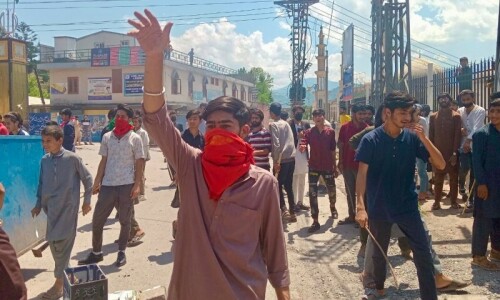THOMAS Carlyle, in his essay Occasional Discourse on the Negro Question, argued that the idea of abolition of slavery was incompatible with high productivity. It was in this essay that he referred to economics as an abject, distressing, and a dismal science; a reference clichéd since.
One may differ over the dismal nature of economics, not least because of Carlyle’s bizarre, racist arguments. But, economists, to be honest, are somewhat distressing and dismal. You can tell if you’ve actually met one. Imagine a CEO on the other hand, and spontaneously the image of a dynamic, enterprising individual with a healthy risk appetite comes to mind.
No prizes for guessing that Imran Khan himself is more of the latter kind. Whether it in cricket and welfare previously, or is in his position as prime minister now, he prefers leaps of faith over prudence. Naturally, he can relate with the grittier CEO kind better.
Of course, Dr Abdul Hafeez Sheikh was the dismal kind — a somewhat paternalistic economist. One may visualise Dr Sheikh telling a restless Khan Sahib week after week that there was no route to his much-promised land in the immediate future with an irritating consistency, worsened by a stoic expression.
How could the corporate giants fail?
On the other hand, Shaukat Tarin, like Asad Umer, is the enterprising kind. How could such corporate giants, with their verve and experience, have failed in economic management?
Indeed, the monetary side of the economy is a somewhat obscure world that lies behind the simpler fiscal side. A policy that is good for raising taxes and building infrastructure — the fiscal side — may lead to higher prices for the common person — a monetary effect — which adversely affects people’s standard of living.
Much like a greenhouse, which otherwise is meant to keep plants warm, can get overheated with the entrapment of too much heat and light, economists say the economy is ‘overheated’ if there is too much inflation. If fiscal policy is like sowing seeds in a greenhouse, the monetary policy is about maintaining its temperature.
According to conventional economic wisdom, you can’t outgrow inflation. That is, a government’s effort to spend more to achieve a higher GDP growth is doomed to failure in times of already high inflation. The government may hope to achieve prosperity with industrial growth, but a stimulus to the economy — say, incentives to spur investment — will almost certainly lead to even higher inflation. And the inflation, unfortunately, comes before the fruit of policy on the fiscal side ie before growth.
The central bank advises policymakers in such circumstances that they’re going to burn the plants in their frantic desire for faster growth. A higher policy rate is one of the bitter pills central banks have to cool the economy, much like opening the windows of a greenhouse.
When Tarin was brought in, the economy was recovering. Government was boasting about the growth it had achieved the previous year (ironically under the Sheikh-Reza Baqir duo). But inflation was still on an upward trajectory. It still needed time to be tamed. In fact, it was suggested that Tarin had been brought in to control inflation.
But Tarin, gauging his boss’s pulse, aimed at instant growth, which was a recipe for worsening inflation. He spared no opportunity to criticise the State Bank for maintaining a ‘high interest rate’, which in his view, had been hurting growth as well as the parity of the rupee somehow. Thus, with much fanfare, Tarin presented a growth budget.
This clearly pressured the State Bank and it tried to accommodate the government’s growth stance, not raising the interest rate for 15 months. With a low interest rate and lesser spreads, the short-term foreign investors have an incentive to pull their (controversial, hot) money out of the economy. Depreciation in turn affects even the longer-term investors, worsened by a rising current account deficit (even higher without the serendipitous remittances) and higher energy prices, which put downward pressure on the currency.
Now, undergoing a change of heart, Tarin Sahib favoured a higher interest rate in an interview and hoped, the State Bank had learned from high inflation and the rupee’s depreciation. Thus, faced with raging inflation, his enthusiasm for lower interest rates and higher growth, his rallying cry a few months back, has all but disappeared. One really wonders who actually needs to learn what.
What, nevertheless, clear is that because businesses don’t have a parallel, elusive monetary side, even the smartest people from the corporate world have a hard time appreciating that investing can indeed be counterproductive for an economy, for example, when overheated. Economists, for their part, can be thick in their own way, a subject for another day. Yet, sometimes an economy in need just needs an economist, even if a dismal one.
The writer teaches economics and development at Szabist, Islamabad.
Published in Dawn, December 25th, 2021










































